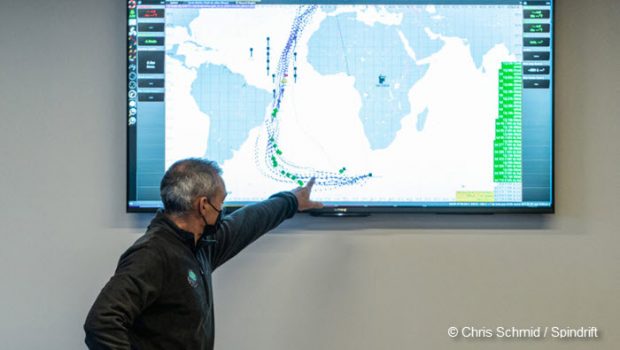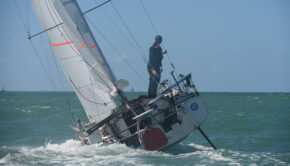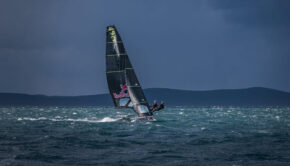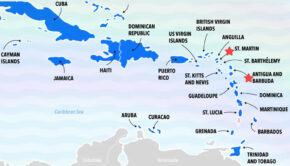Jules Verne attempt postponed
Published on November 25th, 2021
(November 25, 2021) – After committing yesterday to begin their Jules Verne attempt today, it was decided today by Dona Bertarelli, Yann Guichard, and their nine crew to postpone the crewed record around the world.
Upon further analysis of the weather files, the conditions in the South Atlantic for the 37-metre maxi-trimaran Sails of Change (ex-Spindrift 2) are shaping up to be less appealing than those analyzed on two days ago.
This morning, the whole crew was ready to leave the dock in La Trinité-Sur-Mer, Brittany, to head out to sea and set sail from the Créac’h lighthouse over the course of the day. The latest position of the Azores High remains favorable for a very quick ‘descent’ to the equator thanks to a powerful N to NE’ly breeze.
However, the problem comes further down the racetrack as the low pressure systems rolling off Brazil are no longer shifting across towards the Kerguelen Islands, leaving room for a series of high pressure ‘bubbles’ across the course, which are synonymous with a lack of stable breeze…
Therefore, the team will have to be patient for several more days at least until the weather situation becomes favorable again in both the North and South Atlantic. It’s worth noting that the best WSSRC time (World Sailing Speed Record Council in charge of validating international records) between Ushant and the equator is still held by Spindrift 2 helmed by Yann Guichard and his team in 2019 (4d 20h 7’) while the record for the South Atlantic crossing is still in the hands of Francis Joyon and his crew on IDEC Sport in 2017 (7d 02h 23’)…
“That’s the nature of Jules Verne Trophy records and what makes them very hard to beat!” explained Yann Guichard this morning, after consulting the latest grib flies with his onshore router (Jean-Yves Bernot) and his on-board navigator (Benjamin Schwartz).
“This is especially true when the American and European weather files are in agreement that it would be necessary to go right around the outside of the Saint Helena High, avoid the ice close to South Georgia and finally reach the longitude of Good Hope in thirteen days.
“Sails of Change could still cross the equator in under four and a half days. However, despite the configuration in the South Atlantic still being favorable yesterday, that is no longer the case today. On top of that, the low pressure systems in the Southern Ocean are on a very low trajectory instead of tracking eastwards, which would indicate a rather laborious passage across the Indian Ocean.”
In fact, it’s vital to be more than 90% sure you’ll reach the Cape of Good Hope in a sub-twelve-day time to stand a chance of winning the Jules Verne Trophy. That would not be the case if they were to set sail today as planned as there’s precious little chance of them being able to latch onto a last low pressure system rolling off Brazil after a week at sea.
Details: https://spindrift-racing.com/
Ten sailors with complementary backgrounds, five of whom have already circumnavigated the globe, will set sail alongside skipper Yann Guichard on this fourth crewed attempt. Two of them, Thierry Chabagny and Xavier Revil, won the Jules Verne Trophy in 2012, whilst Dona Bertarelli has held the title of fastest woman to sail around the world since 2016.
In all, nine of the eleven sailors have previously been involved in a Jules Verne Trophy attempt. Only Julien Villion and Yann Jauvin will be making their Trophy debut in this legendary international offshore racing event.
2021 crew on the maxi-trimaran Sails of Change
Yann Guichard – skipper
Dona Bertarelli – on-board reporter
Benjamin Schwartz – navigator
Jacques Guichard – Watch leader
Xavier Revil – Watch leader
Jackson Bouttell – Watch leader, bowman
Duncan Späth – sailor
Thierry Chabagny – sailor
Gregory Gendron – sailor
Julien Villion – sailor
Yann Jauvin – sailor, bowman
Jean-Yves Bernot – onshore router
The Jules Verne Trophy is the crewed, unassisted, round the world record under sail. In less than 30 years, the reference time has been halved, from 79d 06h 16’ in 1993 to 40d 23h 30’ in 2017.
Spindrift has made three previous attempts at breaking the record, posting the third best time in history in 2016 and securing the record between Ushant and the equator in 2019. The team has been on standby since November 1.
To put into perspective how difficult it is to win the Jules Verne Trophy, it’s worth noting that out of thirty-three departures off Ushant, just nine of these round the world attempts under sail have been successful:
• Commodore-Explorer in 1993 (79d 06h 16’)
• Enza-New Zealand in 1994 (74d 22h 17′)
• Sport-Elec in 1997 (71d 14h 22′), Orange in 2002 (64d 08h 37′)
• Geronimo in 2004 (63d 13h 59′)
• Orange II in 2005 (50d 16h 20′)
• Groupama 3 in 2010 (48d 07h 45′)
• Banque Populaire V in 2012 (45d 13h 43′)
• Idec-Sport in 2017 (40d 23h 30′)
Intermediate Crewed Reference Times:
Ushant-equator: 4d 20h 07’ (Spindrift 2 in 2019)
Equator-Agulhas Cape: 6d 08h 55’ (Banque Populaire V in 2012)
Agulhas Cape-Cape Leeuwin: 4d 09h 32’ (IDEC Sport in 2017)
Cape Leeuwin-Cape Horn: 9d 08h 46’ (IDEC Sport in 2017)
Cape Horn-Equator: 7d 04h 27’ (Banque Populaire V in 2012)
Equator-Ushant: 5d 19h 21’ (IDEC Sport in 2017)
Crewed Records listed by World Sailing Speed Record Council:
North Atlantic crossing (Ushant-Equator): 4d 20h 07’ (Spindrift 2 in 2019)
Indian Ocean crossing (Agulhas Cape-South Tasmania): 5d 21h 07’ 45’’ (IDEC Sport in 2017)
Pacific Ocean crossing (South Tasmania-Cape Horn): 7d 21h 13’ 31’’ (IDEC Sport in 2017)
Equator-Equator: 29d 09h 10’ 55’’ (IDEC Sport in 2017)
Round the world (Jules Verne Trophy): 40d 23h 30’ 30’’ (IDEC Sport in 2017)
Source: Spindrift Racing









 We’ll keep your information safe.
We’ll keep your information safe.